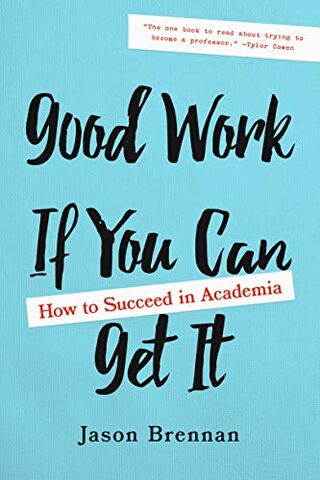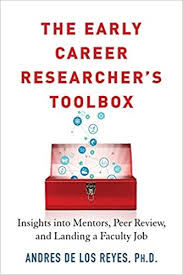How to Succeed In Academia
Two new books help students prepare for a faculty career.
by Jonathan Wai Ph.D.It is arguably one of the most challenging times for students seeking faculty jobs. Two new books, however, have recently been published that are useful for any student who is seeking to understand what it takes to get a faculty job and to succeed in it. These books are Good Work If You Can Get It by Jason Brennan and The Early Career Researcher’s Toolbox by Andres De Los Reyes.

Good Work If You Can Get It (Brennan)
I start with Brennan’s book because it is probably the more direct of the two and is a good book for those at any stage of the process of seeking to become a faculty member. Brennan gives advice targeted at those seeking to know—based on the raw numbers—whether one should get a Ph.D. and in what field (or do something else). He explains how to get into grad school, how to succeed in grad school, and how to position yourself as well as possible for a faculty job (in a short answer: you must publish). Brennan clearly describes what it takes to get a faculty job and where you should focus your efforts. As he points out, “professionalizing in grad school primarily means publishing.” He goes on to say, “If you want to get a job, even a full-time teaching job, publishing beats teaching.” He also argues that “You will never have less expected of you and never face less pressure than you will as a graduate student.”
He explains that ultimately, being an academic means you are judged on your outputs, not on your inputs. He writes, “Academia is a cult of busy…many people regard looking or being busy as evidence that they are important, useful, contributing, or doing their share. That’s a mistake. Busy is beside the point.” Brennan is also the co-author, along with Phil Magness, of Cracks in the Ivory Tower, a book worth reading for a strong critique of some the problems in academia. Some aspects of this other book show up in Good Work If You Can Get It, especially in the concluding section, where he talks about how “Any person with a point of view different from what’s normal in his field will face an uphill battle.” He notes though, that “The bad news for you is that challenging the consensus view on any topic takes hard work. The good news is that you’ll by necessity have to produce better work than you otherwise would.”

The Early Career Researcher’s Toolbox (De Los Reyes)
Next, I turn to the book by De Los Reyes, which uses the concept of theater to help explain how important storytelling and narrative are when it comes to packaging yourself as an interesting academic. The main themes of The Early Career Researcher's Toolbox are to teach you about how to find your “burning question,” how to deal with “peer review,” and ultimately how to build your “research program.” De Los Reyes helps teach academics that storytelling is critical to all forms of science communication, something Siri Carpenter also pointed out but from the perspective of science writers (see "What scientists can learn from science writers").
De Los Reyes explains how each academic resides in a galaxy, and when you seek to work with someone to guide you in your pursuit of the Ph.D. you are ultimately seeking to build and weave your work somewhere within your advisor’s galaxy—as well as other mentors and colleagues that you may develop along the way. This is how he teaches you to find your burning question that is the key driver.
Next, he gives heavily detailed and pragmatic advice on how to approach and deal with peer review. This part of the book alone is worth learning from because it gives behind the scenes clear ways to deal with this process (he even gives example documents you can use) and do it in a way that is constructive and effective. And finally, he explains how to weave together the first two “acts” into the third act, your research program, which he argues for the job market should be an interconnected trilogy of research projects that weave an important narrative that ties back to your burning question and positions you as an interesting person worth hiring. Another key feature throughout the book is the anecdotes from anonymous individuals throughout each career stage – these anecdotes serve to both speak to the reader who has gone through similar challenges or had similar questions, but also illustrate his main points quite well.
Taken together, these are useful books to read side by side. Both are clear and well written, pragmatic, and give you general tools and strategies to be as successful as you can as you seek a faculty job, and also give you advice about when you might know that a faculty job is probably not the right fit for you.